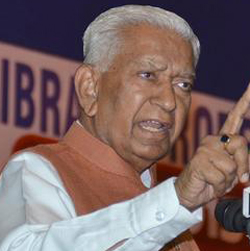Mysuru, Jan 8: Karnataka Governor Vajubhai R Vala, who is known for his controversial statements, on Thursday advised the girls not to go to “as though they were going to a beauty contest”
 Speaking at the valedictory event of the Indian Science Congress here, Mr Vala who has a strong RSS background, expressed displeasure over college girls wearing lipstick and trimming their eyebrows.
Speaking at the valedictory event of the Indian Science Congress here, Mr Vala who has a strong RSS background, expressed displeasure over college girls wearing lipstick and trimming their eyebrows.
Though boys and girls were equally intelligent, girls are more serious in studies than boys, he said. But, he said, there was no need for girls to be fashionable while attending college.
The Governor asked boys to guard themselves against falling prey to unhealthy addictions.
Mr. Vala said the present generation of children was very intelligent. “A small boy can repeat fluently an entire advertisement that he would have seen on TV sometime earlier. During our times, we were unable to understand lessons even if our teacher taught them thrice,” Mr. Vala said jocularly.
The present-day youth were scoring very high marks in exams, he said. “Securing 90 to 95 marks has become the norm now. When we were studying, such high marks would be the total of three years,” the Governor said in a lighter vein.










Comments
Can this be a speech in Science Congress?
These jokers need to be thrown out immediately
It is a inbuilt nature in girls and womens that they love to beautify themselves but it will be dangerous to her when she uncovers her beauty to all kind of men. Good men look other women in a respectable manner but there are bad men who look at different angle. So there is a hijab for women in Islam and hijab for men is to look down when he sees other women.
Add new comment